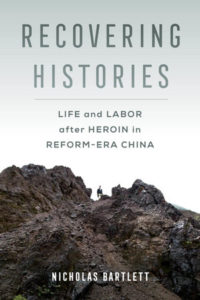Recovering Histories:
Life and Labor after Heroin in Reform-era China
Nicholas Bartlett

(University of California Press and Columbia Weatherhead Series, 2020)
Heroin first reached Gejiu, a Chinese city in southern Yunnan known as Tin Capital, in the 1980s. Widespread use of the drug, which for a short period became “easier to buy than vegetables,” coincided with radical changes in the local economy caused by the marketization of the mining industry. More than two decades later, both the heroin epidemic and the mining boom are often discussed as recent history. Middle-aged long-term heroin users, however, complain that they feel stuck in an earlier moment of the country’s rapid reforms, navigating a world that no longer resembles either the tightly knit Maoist work units of their childhood or the disorienting but opportunity-filled chaos of their early careers. Overcoming addiction in Gejiu has become inseparable from broader attempts to reimagine laboring lives in a rapidly shifting social world. Drawing on more than eighteen months of fieldwork, Nicholas Bartlett explores how individuals’ varying experiences of recovery highlight shared challenges of inhabiting China’s contested present.
ABOUT THE AUTHOR
Nicholas Bartlett is an Assistant Professor of Contemporary Chinese at Barnard College. Please visit the Weatherhead East Asian Institute website for the WEAI Author Q&A: Nicholas Bartlett’s Recovering Histories.
For additional information and to purchase, please visit University of California Press.

